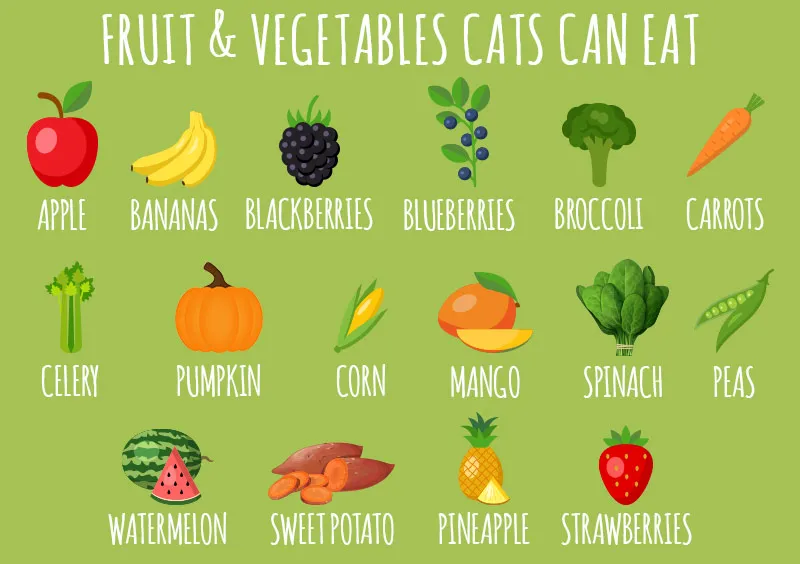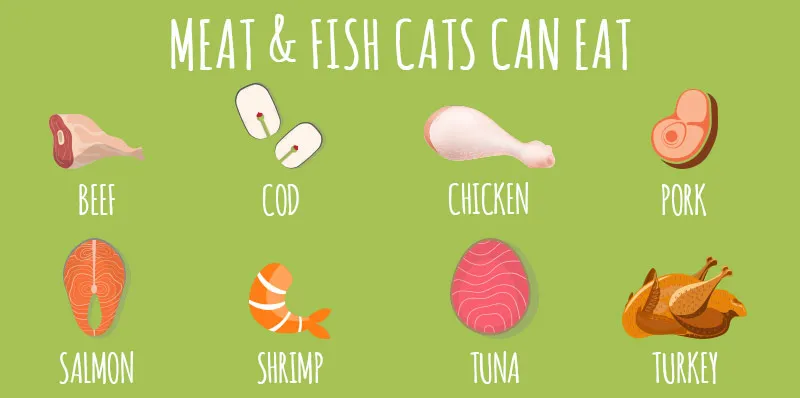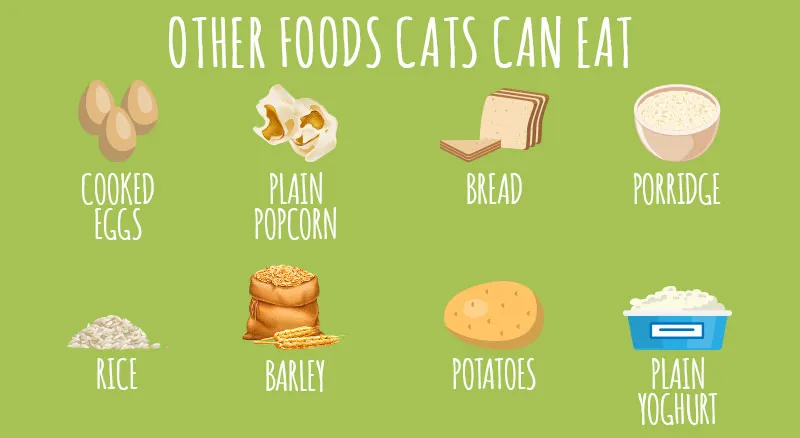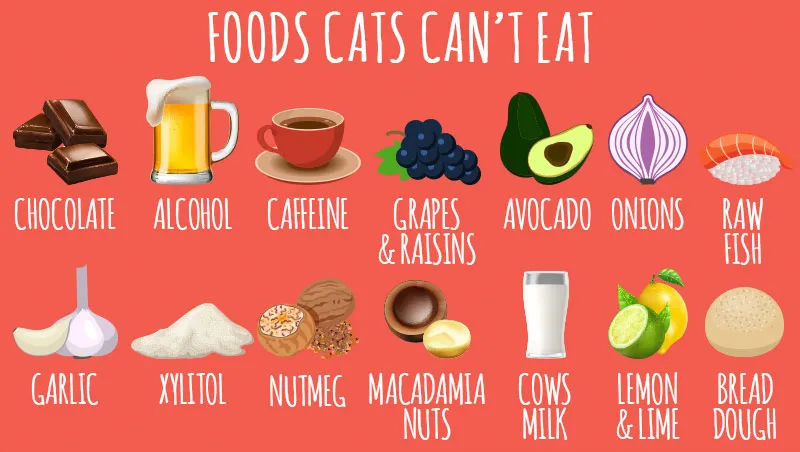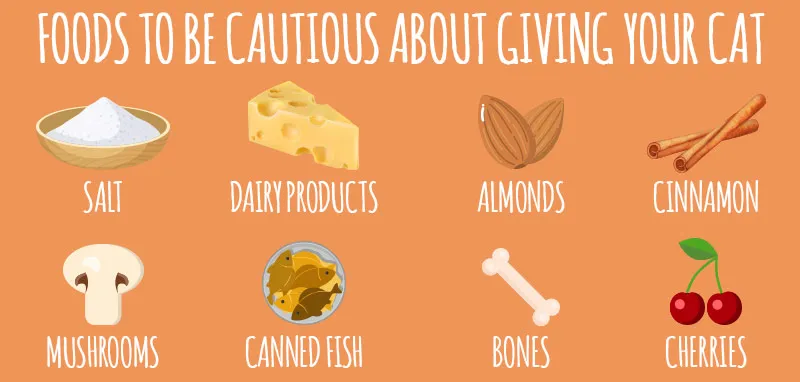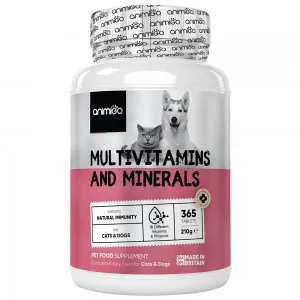What can cats eat?
If you’re one of the many people always asking questions such as ‘what can you feed cats?’ and ‘what do cats like to eat?’, then you’re in the right place. There are a lot of foods cats love to eat as well as some that they may not particularly enjoy so much but are very good for their health! By adding some of these foods to your cat’s diet on a daily basis, it can make a real difference to their health and have numerous benefits for their whole body.
Fruit and vegetables
We’ve all heard the importance of eating our fruit and vegetables and it is the same for cats. This is because they’re full of amazing nutrients including vitamins and minerals that have a number of substantial benefits for cat’s body. They’re also full of other great elements for your cat’s health too, including protein for their muscles, fibre for their digestion and good sugars for their energy levels. Whilst they may not be a cats favourite food, or even something they should eat an abundance of, fruit and vegetables should still be a part of your cat’s daily diet. Not all of them are good for cats though, so to help you out, here are some of the best to give them and after that, you just need to figure out their favourites!
Meat and fish
If you’re wondering ‘what do cats like to eat?’, then meat and fish would, of course, be their favourite. Cats are naturally meat-eaters, and so will, therefore, always enjoy eating both meat and fish. As a result, there isn’t one that they particularly don't like to eat, however, there are some cautions you need to take first. You should never give your cat spoiled or uncooked meat or fish - in general, if you wouldn’t eat it yourself, don’t give it to your cat! Make sure as well that it doesn’t contain any added preservatives, flavourings, salt or spices as these can cause issues for your cat’s stomach.
But what is the best meat and fish for your cat? The two most popular types of meat include poultry, such as chicken and turkey, as these are leaner and contain fewer fats. The second is red meats such as beef as these contain high levels of iron. When it comes to fish, the best kind for both humans and cats alike are oily fish, for example, cod, salmon and mackerel. These can be considered the best because they contain high levels of beneficial fatty acid omega 3, which contain both eicosapentaenoic acid (EPA) and docosahexaenoic acid (DHA). These are amazing for your cat’s health and wellbeing as they’re said to help numerous bodily functions as well as their bones, joints, fur, skin, vision, heart and brain!
Other foods
In addition to fruit, vegetables, meat and fish, there is a whole range of other safe foods your cat can eat. These are usually the most questioned when it comes to cats eating ‘people food’, so if you’re one of the many people asking things like ‘can cats eat eggs?’ or ‘can cats eat bread?’, then your questions can finally be answered! These all come from a natural origin so can be considered healthy for your cat and can have their own unique benefits; whilst they may not have the same amount of micronutrients, vitamins and minerals as fruits and vegetables or protein as meat and fish, they can still be useful in their own way. For example, these foods can be great for keeping your cat feeling full, for bulking out a wholesome meal or for using as a delicious treat to reward them for doing something good!
What can cats not eat?
Cats and humans metabolise foods differently, and as a result, there are a number of foods poisonous to cats that we can eat with no issues. The foods under this category are very important to avoid and, especially if unsure, should be questioned before feeding to your cat. So if you’re wondering is chocolate bad for cats, or can they have coffee, then make sure you read this list first!
So why are these specific foods bad for cats, whilst others aren’t? Each of these either contains complex compounds that are toxic to cats or are something that their body just cannot digest properly. A perfect example of this is chocolate. All types of chocolate, including dark, milk or white chocolate (and even baking chocolate), contain both theobromine and caffeine. Theobromine cannot be metabolised properly by cats which lead to a chocolate toxicity build up, whereas caffeine is a stimulant that cats can’t cope with in the same way we can.
You’ll know if your cat has eaten one of these foods if they have symptoms that include vomiting, diarrhoea, weakness, breathing difficulties and dehydration. Eating some of these can even result in far more serious consequences such as kidney failure, so it is very important that you know each of the foods on this list and avoid giving them to your cat at all costs!
Foods to be cautious about
Foods in this group are ones that can be given to your cat, but you should be cautious about them. In general, what cats eat should be monitored, but with these, you need to be extra careful; most of these foods should be given to your cat in small quantities as too much can cause them potential harm. Others are foods that you need to watch carefully when giving your cat. For example, your cat can enjoy gnawing on a bone, but they can splinter and become sharp and dangerous so will then need to be taken away and safely disposed of if this happens.
Summary
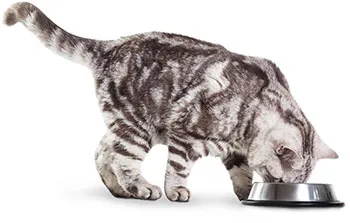
Thanks to reading this list, you should now know the importance of what cats eat on a daily basis, as well as what foods can be good for them and what to avoid. Many people think that ‘human’ food shouldn’t be given to cats and although certain foods, as well as processed goods, should be avoided, there are plenty you can give them that they can benefit from as well as enjoy eating. Cats would naturally be eating foods such as meat, fish and vegetables as they contain what is needed for them to be healthy and balanced, so they can make a great addition to their modern diet.
If you’re finding it hard getting everything they need, especially all the vitamins and minerals, into their daily food, you can also consider adding a natural multivitamin powder supplement for cats into their daily routine for that added boost. Overall though, once you understand what can cats eat and what can cats not eat, you’ll be armed with the knowledge of what to feed them to keep them feeling fit, happy and healthy!
